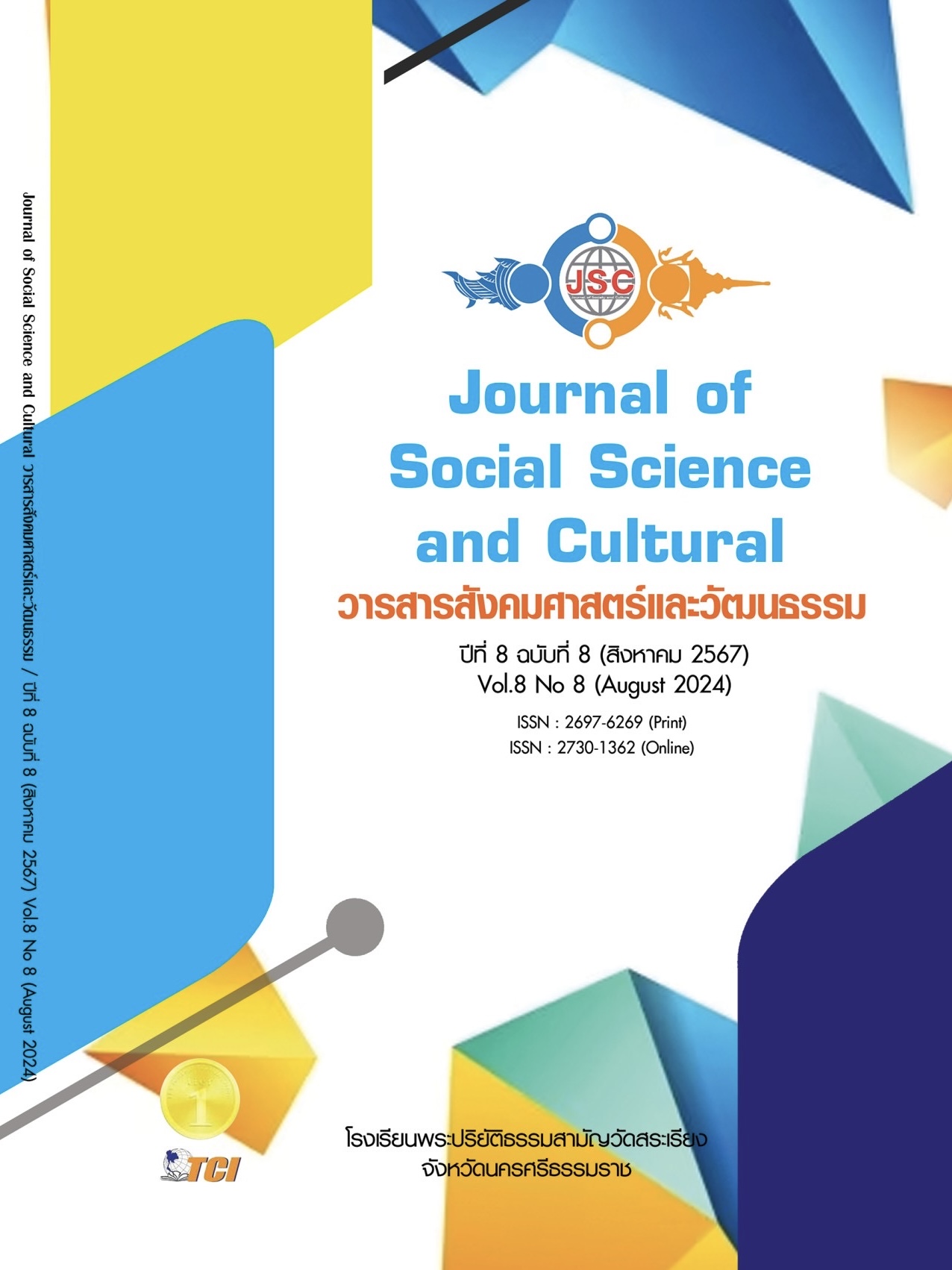DEVELOPMENT OF AN ADMINISTRATIVE MODEL FOR REHABILITATION OF CHILDREN AND YOUTH IN THE JUSTICE SYSTEM
Main Article Content
Abstract
This research aims to study 1) to study the elements of effectiveness in the administration of the Juvenile and Family Court in the Juvenile Counseling and Rehabilitation Center; 2) to study the problem conditions. Obstacles and guidelines for developing the management process As for the counseling and rehabilitation centers for children and youth that are effective, this research is a qualitative research. The sample used in the study is workers in the Provincial Juvenile and Family Courts under the Office of the Chief Justice in 9 provinces. Region includes the head of the counseling center. Psychologist at the counseling center The sample group totaled 18 people, consisting of the head of the counseling center. and psychologist The results of the study found that problems, obstacles, and guidelines for developing the management process Found a problem with a lack of coordination. Especially organizations in the public sector still lack cooperation. mutual understanding Lack of information exchange and lack of joint planning. In addition, there is the issue of conflicting uses of power. or overlapping in some matters It can lead to conflicts in operations from time to time. This makes unified development difficult. For private sector organizations There is still a lack of support to enable them to develop their potential to play a greater role in treating children and youth in the justice process. The researcher has suggestions for developing a collaborative system between various agencies. In the juvenile justice process, for example, relevant agencies should have an administrative structure that facilitates coordination between agencies. There should be an administrative policy that goes in the same direction. There should be an integrated operational plan.
Article Details
References
กระทรวงยุติธรรม. (2560). กระบวนการยุติธรรมเชิงสมานฉันท์. กรุงเทพมหานคร: โรงพิมพ์ชุมนุมสหกรณ์การเกษตรแห่งประเทศไทยจำกัด.
กิตติพงษ์ กิตติยารักษ์ และคณะ. (2565). กระบวนการยุติธรรมเชิงสมานฉันท์: ทางเลือกใหม่สำหรับกระบวนการยุติธรรมไทย. กรุงเทพมหานคร: โรงพิมพ์เดือนตุลา.
เกียรติขจร วัจนะสวัสดิ์ และคณะ. (2559). สิทธิมนุษยชนและกระบวนการยุติธรรมทางอาญาในประเทศไทย ชุดศึกษาวิจัยพัฒนาการสิทธิมนุษยชนในประเทศไทย. กรุงเทพมหานคร: เจริญวิทย์การพิมพ์.
จิตฤดี วีระเวสส์. (2559). ความยุติธรรมเชิงสมานฉันท์ในศาลยุติธรรมไทย: การศึกษาตัวแบบที่เหมาะสมเกี่ยวกับความรุนแรงในครอบครัว. ใน ดุษฎีนิพนธ์นิติศาสตรดุษฎีบัณฑิต สาขานิติศาสตร์. มหาวิทยาลัยธรรมศาสตร์.
จิรนิติ หะวานนท์. (2566). ศาลเยาวชนและครอบครัวคือ Problem Solving Court. ดุล พาห, 60(1), 90-96.
นิศรา รัตนเกียรติกานต์. (2558). มาตรการพิเศษแทนการดำเนินคดีอาญา: ศึกษาการมีส่วนร่วมของผู้แทนชุมชนในการจัดทำแผนแก้ไขฟื้นฟูในชั้นก่อนฟ้อง. ใน วิทยานิพนธ์นิติศาสตรมหาบัณฑิต สาขานิติศาสตร์. มหาวิทยาลัยธุรกิจบัณฑิตย์.
บัณฑิต โต้ทองดี. (2555). กระบวนการยุติธรรมเชิงสมานฉันท์: ศึกษาการเบี่ยงเบนคดีความรุนแรงในครอบครัว. ใน วิทยานิพนธ์นิติศาสตรมหาบัณฑิต สาขานิติศาสตร์. มหาวิทยาลัยธุรกิจบัณฑิตย์.
ประกายรัตน์ ต้นธีระวงศ์. (2559). การใช้กระบวนการยุติธรรมเชิงสมานฉันท์ในการจัดการความขัดแย้งทางอาญาในศาลเยาวชนและครอบครัว. ใน วิทยานิพนธ์ศิลปะศาสตร์มหาบัณฑิต สาขาวิชาการจัดการความขัดแย้งแบบบูรณาการ. มหาวิทยาลัยราชภัฎวไลยอลงกรณ์ในพระบรมราชูปถัมถ์.
พิชญา เหลืองรัตนเจริญ. (2548). กระบวนการยุติธรรมสำหรับเด็กและเยาวชนที่ถูกกล่าวหาว่ากระทำความผิด. ใน ดุษฎีนิพนธ์นิติศาสตร์ดุษฎีบัณฑิต สาขานิติศาสตร์. มหาวิทยาลัยธุรกิจบัณฑิตย์.
วิจิตร์ ชาติกิจเจริญ. (2564). การพัฒนาประสิทธิภาพกระบวนการยุติธรรมทางเลือกสำหรับเด็กและเยาวชนที่กระทำผิดในคดีอาญา. วารสารวิชาการ บัณฑิตวิทยาลัยสวนดุสิต, 7(1), 55-65.
วิชัย ช้างหัวหน้า และคณะ. (2563). รายงานฉบับสมบูรณ์ (Final Report) เรื่อง การนำหลักความยุติธรรมเชิงสมานฉันท์ไปใช้ในการประนอมข้อพิพาทในคดีอาญา: ศึกษากรณีของศาลอาญาสนับสนุนโดยสำนักงานกองทุนการวิจัย (สกว.). เรียกใช้เมื่อ 26 พฤษภาคม 2563 จาก http://www.djop.go.th


